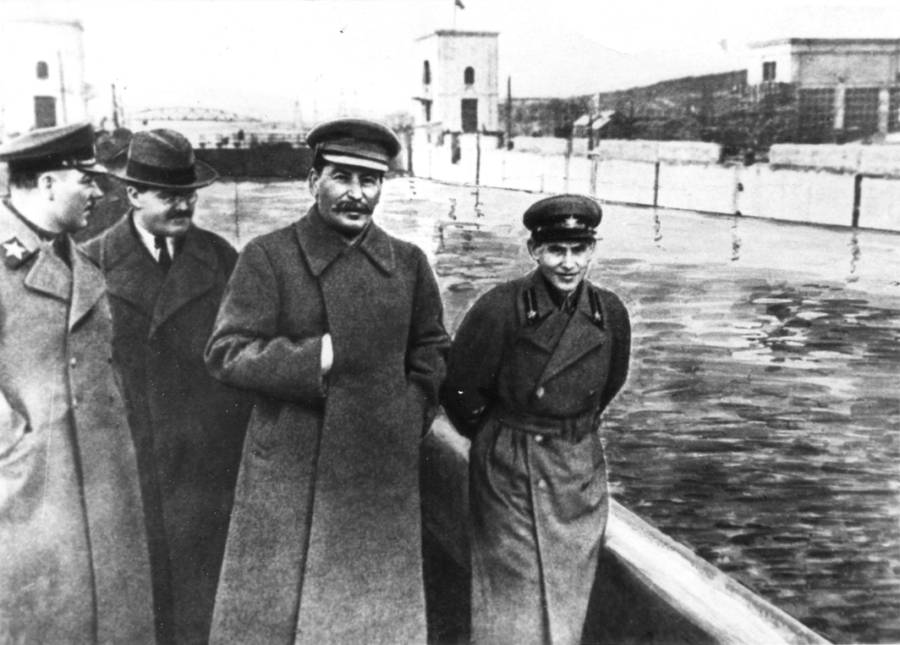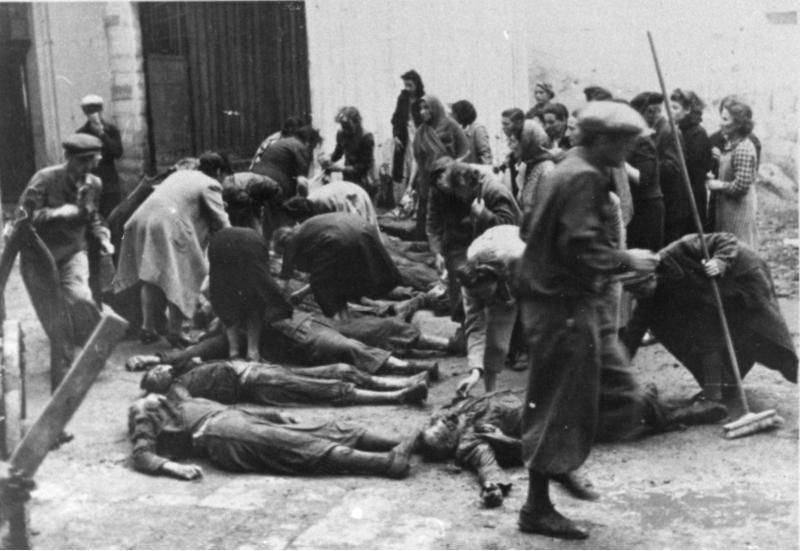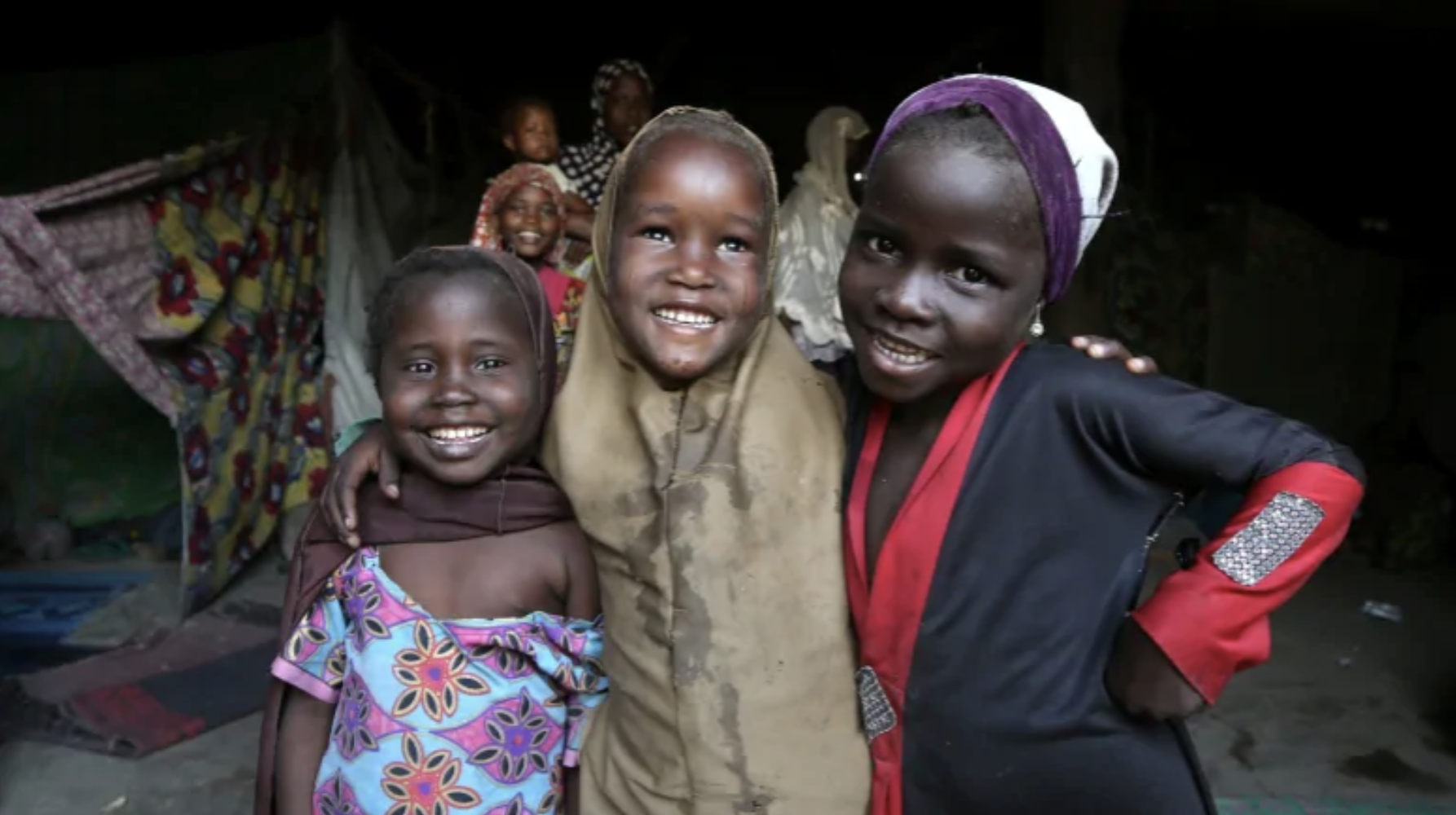
Soviet leader Josef Stalin inspects the Moscow Canal, built by enforced workers in April 1937. [Wikimedia Commons]
The Second World War set a new standard for disappearances. Unprecedented millions simply vanished during the maelstrom in Europe and the Far East, many under genocidal conquests by Japanese forces in China and Nazis on the continent.
The German penchant for detail and meticulous record-keeping answered the questions of many who suspected Jewish and other relatives had been shuttled off to concentration camps, only to die by gas or gun.
Still, millions more family members have lived out their lives never knowing what happened to loved ones who vanished without a trace between 1939 and 1945.
But it is not only war that accounts for the unaccounted. Totalitarian regimes such as those in China and the Soviet Union simply eliminated opposition and potential opposition by disappearance and death. The practice turned the word “disappeared” into an active verb, as in “he’s been disappeared.”
Josef Stalin of the USSR is estimated to have killed up to 26 million of his own people, many after they’d been taken to Gulag forced-labour camps. Millions more have gone missing in the wars and political and social upheavals of subsequent decades.
As many as two million Cambodians disappeared and are known or believed to have died under Pol Pot’s ruthless Khmer Rouge between 1975 and 1979.
Totalitarian regimes such as those in China and the Soviet Union simply eliminated opposition.
They included former military, political and business leaders, journalists, students, doctors, lawyers, intellectuals, Buddhists, Chams, Chinese Cambodians, Christians and Thai- and Vietnamese-Cambodians. They were victims of genocide, ethnic cleansing, extrajudicial killings, torture, famine, forced labour, human experimentation, enforced disappearances, deportation and crimes against humanity. People were killed because of their politics or social and economic class.
The Vietnamese invasion of Cambodia ended the horror in January 1979. Two years later, the new Cambodian government established a tribunal that tried and convicted members of the Pol Pot regime of crimes against humanity.

Bodies of political prisoners murdered by secret police in a prison camp in Ternopil, Ukraine, in July 1941. [Wikimedia]
Missing persons are the result of any number of circumstances, it noted in a 2006 report on the issue:
- People are killed on capture, arrest or abduction. Some die in custody, disappear or are held in secret locations. Families either do not know where they are or are not allowed to visit or correspond with them. Critical data on their fates are frequently withheld, destroyed or not recorded.
- Mass killings account for many disappearances. Victims’ bodies are often abandoned, buried in haste or even destroyed.
- Families often don’t know the whereabouts of relatives in militaries or armed groups because they are given no means of staying in touch.
- Soldiers or fighters may go missing in action because they have not been issued with any means of identifying themselves, such as identity discs.
- Displaced persons and refugees, isolated populations and people living under occupation may be unable to send news to their next-of-kin.
- It is not unusual to find children on their own, having been separated from their families either while fleeing fighting or because they were forcibly recruited, incarcerated or even hastily adopted.
- Evidence confirming death is not always preserved and handled appropriately during exhumations and post-mortem procedures.
Tens of thousands of Chileans notoriously disappeared under the military dictatorship of General Augusto Pinochet between 1973 and 1990.
The Pinochet regime and its secret police refined the art of “disappearing” those considered potentially subversive, largely because they adhered to leftist political doctrines, particularly during its early years.
Some 14,000 people remain unaccounted for in the countries that make up the former Yugoslavia.
The “disappeared” were held in secret, subjected to torture and were often never seen again. The military rule was characterized by systematic suppression of political dissidence in what became known as “politicide,” or political genocide.
Some 14,000 people remain unaccounted for in the countries that make up the former Yugoslavia—nearly half the total of those who disappeared in the decade after war broke out in 1991. Between 1991 and 2001, a total of 34,700 people were reported missing due to enforced disappearances or abductions in the region, reports Amnesty International. Most of their relatives still wait for justice. The cases still resonate among Canadian peacekeepers.

Bosnian and Croatian prisoners of war at a prison camp in Manjača, Bosnia, in August 1992. [Wikimedia]
- The fates of fewer than 4,100 of the 6,406 people reported as missing after the 1991-1995 war in Croatia have been traced.
- About 30,000 people had been reported missing by the time the Bosnia and Herzegovina conflict ended in 1995; the fates of about 10,500, most of them Bosnian Muslims, are still unknown.
- After the 2001 conflict between the ethnic Albanian National Liberation Army and Macedonian security forces, authorities failed for a decade to effectively investigate hundreds of allegations of enforced disappearances.
- Some 3,600 people were reported missing in Kosovo in 1998-99. They included more than 3,000 ethnic Albanians taken by Serbian military, police and paramilitary forces. Some 600 Serbs, Roma and members of other minority communities are believed to have been abducted by Kosovo Albanians, including the Kosovo Liberation Army. About 1,797 remain unaccounted for.
“People living in the Balkans have not closed the chapter on enforced disappearances,” said Jezerca Tigani, the ICRC’s Europe and Central Asia deputy programme director. “They are a daily source of pain for the relatives still waiting to learn the fate and whereabouts of their loved ones, still searching for truth, justice and reparation.
“The victims of enforced disappearances come from all ethnic groups and from all walks of life. Civilians and soldiers, men, women and children—their families have the right to know the truth about the circumstances of the enforced disappearance, the progress and the result of the investigation and the fate of the disappeared person. For families of the disappeared, having the body returned for burial is the first step towards achieving justice.”
In Latin America, hundreds of thousands have been reported missing in connection with past and present armed conflicts, continued armed violence, natural disasters and the constant tide of migration. The Red Cross considers the problem “a daunting humanitarian challenge.”
In a 2019 report on the region, the ICRC estimated at least 83,000 people had disappeared in Colombia, more than 45,000 in Guatemala, more than 20,000 in Peru and more than 5,000 in El Salvador—all in connection with armed conflicts.
“Today, people continue to disappear in considerable numbers in Latin America as a result of different situations of violence,” said the organization. “In Mexico, more than 40,000 people were reported missing between 2006 and 2019, and in Brazil, more than 80,000 cases were reported in 2017.”
Almost 44,000 Africans were registered as missing by the ICRC as of August 2020, 45 per cent of them children at the time of their disappearance.
“This number of cases is a drop in the ocean for the real number of people whose families are looking for them,” said Sophie Marsac, the organization’s adviser for missing persons in Africa, in a statement issued in Nairobi on the occasion of the International Day of the Disappeared, which is marked each Aug. 30.
“Today, people continue to disappear in considerable numbers in Latin America.”
“Conflict, violence, migration and the climate crisis have continued to separate families in the [COVID-19] pandemic, but our work to find the missing has become even more difficult.”
Nigeria, Ethiopia, South Sudan, Somalia, Libya, Cameroon and the Democratic Republic of the Congo account for 82 per cent of the ICRC’s missing cases in Africa.
“My son’s disappearance has made me desperate,” said Juma Kedai Korok, whose 31-year-old son was abducted four years ago by an armed group in South Sudan. He has had no news since.
“Dear son Konyi, if you are still alive and listening to me, your sisters, brothers, aunts and the whole family are waiting for you. We just want to hear your voice and see you,” his father added in a statement.

Girls pose in a house at a community for displaced people in Maiduguri, Nigeria, in 2016. (Afolabi Sotunde/Reuters)
With almost 23,000 missing, Nigeria has the most critical situation of disappeared in African. Almost all are victims of the conflict in the country’s northeast, where the jihadist group Boko Haram conducts most of its operations.
COVID-19 has created new challenges in the search for the missing, as it is not possible to assemble large groups to hear names or look at photos, said the ICRC.
To curb the spread of the coronavirus, many countries have suspended national travel between states or provinces, making it difficult for searches to be carried out over wider geographical areas.
“Countless families in Africa are searching for a loved one, many of them parents looking for a child,” said Marsac. “The tragedy of the missing is a humanitarian crisis that cannot be forgotten as the world focuses on fighting the COVID-19 pandemic.”
Advertisement






















